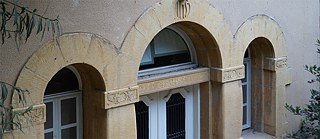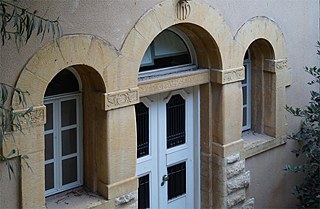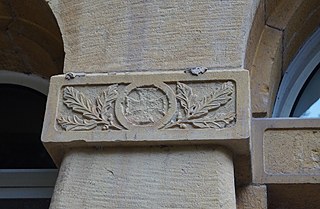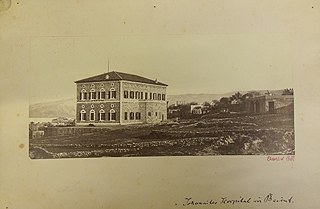Traces of Germany in Lebanon
The Johanniter Hospital in Beirut

The history of healthcare in Beirut also exhibits connections to Germany. This is because until the end of World War I, the grounds of the modern-day École Superieure des Affaires (ESA) used to be the site of the Johanniter Hospital, which was funded through donations by the Order of St. John and was inaugurated on 7 January 1867.
Between 1871 and 1917 the hospital’s doctors were recruited from the professors of medicine at the Syrian Protestant College, which later became the American University of Beirut. Around 1900, eight deaconesses from Kaiserswerth, supported by local nursing staff, were responsible for the care of about 500 patients per year. The cooperation with the American doctors ended in 1917 when the United States declared war on the German Reich and working together no longer seemed appropriate for political reasons. The president of the Syrian Protestant College, Reverend Bliss, pleaded for a continuation of the joint hospital administration, but the governing body of the Order of St. John decided against it, as the Chancellor of the Order informed the president of the college:
After World War I, the Johanniter Hospital fell under French control and was intended to serve as a French army hospital. According to a number of reports, however, the buildings were in very bad condition in 1927 and were most probably not in use. A reopening of the hospital by the Order of St. John was prevented by a lack of funds.
And so negotiations were struck up regarding the sale of the property of the Order of St. John to the French State and the non-recognition of article 438 of the Treaty of Versailles. The negotiations proved difficult because they would set a precedent for unsolved disputes regarding the property rights of the Sisters of Mercy of St. Borromeo and the Kaiserswerth deaconesses. After hard bargaining, the hospital was sold to France for the equivalent of 32,000 US dollars in October 1929.
An adjacent building, which now bears the name Villa du Pasteur, i.e. parish house, and is used for visiting scholars at the ESA, still shows traces of its previous users: the arched cornices at the entrance and the windows in the basement feature four heavily damaged different signs of the cross; one of them in the Maltese style. The undamaged keystone of the arch above the entrance bears the nomen sacrum IHS – the abbreviation iota-eta-sigma stands for Jesus. Later on, the former parsonage of the Protestant congregation in Beirut became home to the priests of the Église Protestante Française de Beyrouth, after which it was occasionally used as a kindergarten for the Collège Protestant. There used to be an inscription above the entrance, but the letters have been chiseled away. It may have once read “GOTT GRUESSE DICH” (‘God’s greetings to you’).
Sources:
- Anstalten der Johanniter in Beirut, in: Politisches Archiv des Auswärtigen Amtes [PAAA], Konsulat Beirut, Paket 32
- Auslandstationen Beirut, Johanniter-Hospital, in: Archiv der Fliedner-Kulturstiftung Kaiserswerth [AFKSK], Akten der Kaiserswerther Diakonie [AKD], Box 241
- Catalogue of the Syrian Protestant College, 35th year (1900/01), S. 47f.
- Debbas, Fouad: Beyrouth. Notre Mémoire. Promenade Guidée à travers la collection de cartes postales de Fouad Debbas, Beyrouth 1986, S. 128


